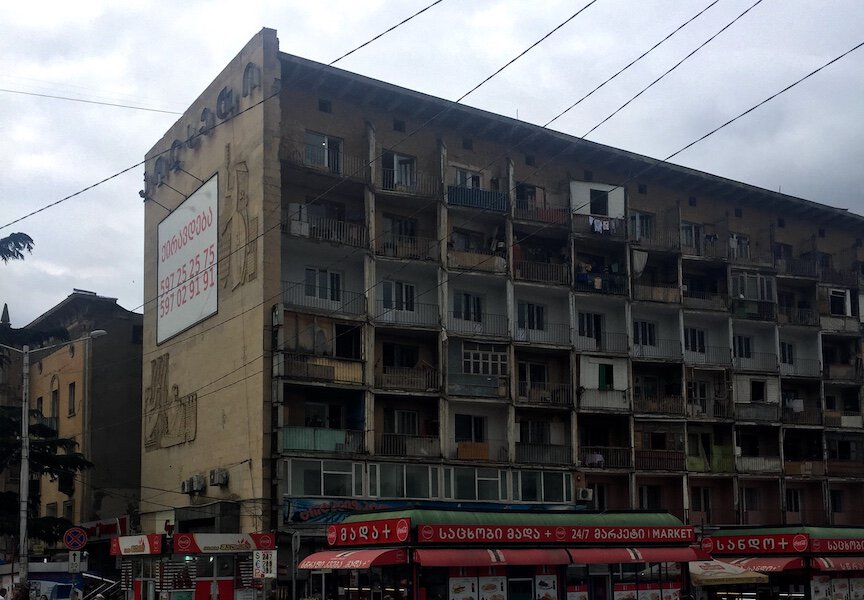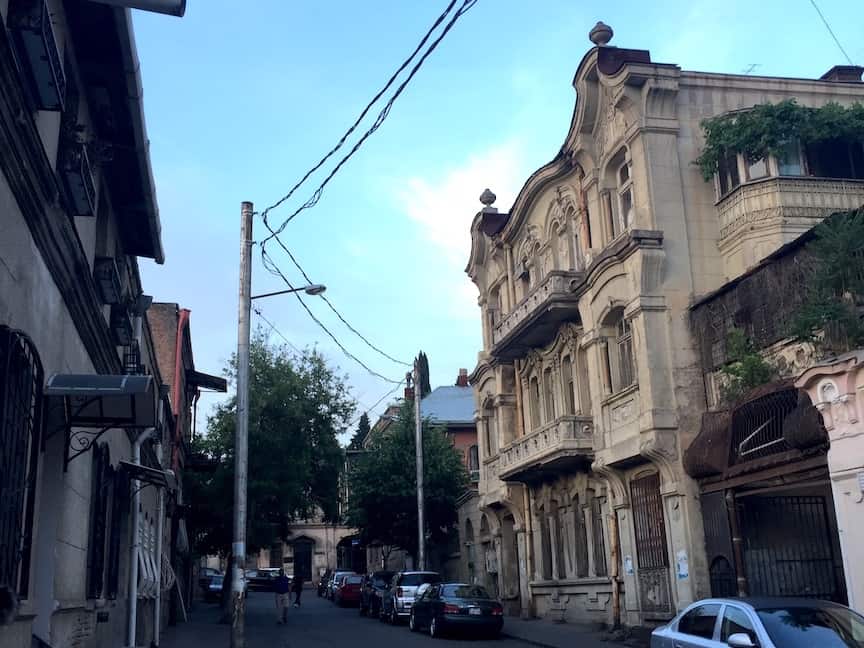HOW TO MOVE TO TBILISI – Visas, Housing, and more
Navigating bureaucracy in Georgia’s capital might be tough – but it’s so worth it.
Tbilisi is — without a doubt — one of the coolest cities in the world today.
With a low cost of living and incredible music, art, and fashion coming out of the Georgian capital, it’s understandable why you might want to move to this historic town.
Moving around the world, however, is difficult. You’ve got to manage visas, housing, basics like power and water, and so much more — trust me, I’ve done it five times in the past decade!
To assist you on your journey to Georgia, I’ve written a comprehensive guide to moving to Tbilisi. As a warning, some of this information might be dense, but if you’re serious about moving to Tbilisi, this is the guide is for you.
**Note: I am not a lawyer. Although I’ve done a TON of research for this article, laws change constantly, and I will try to keep this as up-to-date as possible. If you are serious about moving to Georgia, don’t be afraid to call the consulate or the Ministry of Foreign Affairs and ask them questions.**
How do I get a Georgian visa?
A better question is, do you need one?
Georgia is pretty loose with the visa-free requirements. In fact, citizens of many nations can stay in the country for a full year — that’s 365 days — with no visa whatsoever. Furthermore, if you leave the country and come back, that year starts all over again.
That means you can live in Georgia from January 1st until the end of December, spend New Year’s with your friends in another country, then return, all while still falling in line with their visa requirements (I have confirmed this information with the Ministry of Foreign Affairs of Georgia).
What about work? Well, if you are a freelancer, journalist, or are simply visiting the country for a business meeting, you require no supplementary visa to work in the country. You are also not required to declare residency.
All that being said, you cannot get a job in Georgia without a visa. Previously, it was fairly common for local companies to offer work to foreigners who came on tourist visas, and while some companies may still do this, it is technically illegal and should not be seen as a viable option for those considering moving to the city.
Subscribe to the mailing list
Get updates from Eastern Europe and more, including guides, tips, and news!

An apartment building in Tbilisi.
Many apartment buildings in Tbilisi are fairly ugly from the outside, but I promise the majority are much prettier on the inside.
How do I find an apartment?
This is the hardest part about moving to Tbilisi.
Many of the apartment deals in the country work on a sort of “handshake” basis. Landlords want to meet you in person, ensure that you can actually pay for the apartment, then get you moved in.
However, a lot of these landlords are older people who don’t speak English. Getting to know them before moving in is difficult, and as a result, foreigners often end up paying way more for apartments than they should.
GG.se is the best website for finding apartments. Do a little searching about which neighborhood you want to live in first, but overall, this database is pretty comprehensive when it comes to the current offerings on the Tbilisi apartment market.
Note that prices are frequently quoted in US dollars, and landlords will often expect payment in this currency.
My honest advice is to begin by getting a short term rental through sites like Airbnb and Booking.com, then working your butt off to meet locals once you arrive. A local will help you navigate this system better than any agency ever could, and they’ll ensure you’re getting the best deal you can.
ALWAYS MAKE SURE YOU SIGN A CONTRACT. I’ve heard plenty of horror stories about people getting kicked out of their “unofficial” housing because their landlords saw an opportunity to make a few extra bucks.
Just so you’re aware of current prices, as of right now (2019), the cost of a one bedroom apartment in the city center is about $350/month, with that price going down to less than $200 as you reach the edges of the city. Naturally, prices increase as the size increases, with three bedroom apartments in the city center going for around $650.
Is it hard to set up basics (internet, power, phone, etc.)?
Not at all.
First, chances are your new apartment will already have power and water, so let’s not worry about that for now (by the way, you can drink the tap water in Tbilisi — don’t worry!).
Internet may be a different story. Here’s what you need to know.
Silknet offers Fiber Optic internet for a very reasonable price: $10/month for 20mps speeds, going up to $34/month for 100mps speeds. Ordering couldn’t be easier — just go on their site and fill out all of your information, then they will contact you to help you set everything up. MagtiCom offers a similar service.
When it comes to your cell phone, there are a few options.
First, DON’T buy your cell phone plan at the airport. Those stations are designed for tourists and will thus a) overcharge you and b) sell you only a short term plan.
If you are interested in a mobile phone plan, there are several different companies: MagtiCom, Geocell, and Beeline. My recommendation would be MagtiCom. You go to their store, buy a SIM card for 3₾ (about $1), then sign up for one of their monthly packs. These packs range from 5₾ for 1 GB/month to 30₾ for 20 GB/month all the way up to 150₾ for an unlimited plan. You can learn more about your various cell phone plan options here.
How do I get health insurance in Tbilisi?
While technically not necessary during your time in Tbilisi, it’s always a good idea to buy health insurance, especially if you plan for a more permanent relocation. Georgia doesn’t offer free healthcare, so just in case you are struck with illness or have an accident, it’s better to err on the side of caution and buy an insurance plan.
There are three main health insurers in Georgia: Aldagi, GPI, and ImediL. There are other places that offer pricier travel insurance, but if you’re interested in long-term insurance in the country, these are the companies you should be looking out for.
All insurance providers offer a range of plans with a comparable range of prices. GPI, for example, offers a “MEDI – Basic” plan at a rate of 10 GEL per month, or about $3. Their most expensive plan, “MEDI-Premium,” covers significantly more and costs 50 GEL, or just under $17/month.
Depending on your plan, you might be required to go to an “in-network” healthcare provider (if you’ve ever had health insurance in the USA, this will be a familiar concept to you). To use GPI as an example again, they only officially support a few institutions that offer services in English, though these locations are usually sufficient. You also might be able to get a portion the money you’ve spent on an English speaking doctor repaid by your insurance, depending on your plan. The US Government has compiled a list of English speaking doctors in Georgia, which might be a good place to start if you’re looking for care.
In researching this article, I found the company Ardi, which offers insurance from 33 to 88 GEL monthly ($11-$30). They also support Mediclub, often regarded as one of the better providers of English-speaking medical assistance in the country.
In summary, if you’re seriously considering buying medical insurance, I would suggest calling one of the companies I mentioned or walking into their offices. An English-speaking representative will gladly connect you with someone who can help you out.
How expensive is Tbilisi?
It’s cheap. The average net income of people in Tbilisi is only around $270, so if you earn more than that, you will live fairly comfortably.
For context, a beer at a bar will run you about $1, and a full meal for two with several courses will be at most $20. Other costs, such as transit, are also incredibly low — a single train ticket costs only about $0.20.
How do I pay taxes?
Again, you might not have to.
If you are earning money from abroad – for example, if you are a freelancer earning money from a company in the United States – the Georgian government will charge you exactly zero dollars in income taxes.

A street in Tbilisi.
It’s unclear exactly how long this system will last, but as of 2019, this is the case and it shows no signs of slowing down.
If you become a tax resident of Georgia, you will have to pay taxes, though they are incredibly low. As of 2019, income tax is at 20%, VAT is at 18%, corporate tax is at 15%, capital gains tax is at 5%, and property tax is at an unbelievably low 1%. If you’re not sure if this will apply to you, chances are it won’t.
If you do pay taxes, you can file online, which makes the whole process fast and easy!
How safe is Tbilisi?
The US Embassy’s page on Georgia warns that the two greatest health concerns for Americans in the country are “Georgian drivers and secondhand smoke,” but those risks could probably be inferred after only a short visit.
Overall, Tbilisi is an incredibly safe city. As a foreigner, you’re far more likely to have someone rip you off when trying to sell you something than to have someone make a go at your wallet. I only have experience as a tall white dude, but female friends have reported feeling safer in Tbilisi than in other cities they’ve visited, as much as such a feeling can be quantified.
To put some numbers on it, Georgia reported 35,997 crimes in 2016, with the majority of those crimes being crimes against property and drug-related offences – pretty good for a country with a population of 3.7 million people.
What’s the expat scene like in Tbilisi?
Small – but growing. There’s an active Facebook group called Georgian Wanderers, where expats and travels meet up and discuss the goings-on throughout the country. Additionally, more and more social clubs, classes, and more are accepting English speakers, so as time progresses, I am sure the expat scene will expand.
Really, the expat scene is what you make it. If there isn’t a club or social group for a topic you’re interested in, start one; as more people pour into the city, you’re sure to find interested participants.
Do I need to learn Georgian?
No – but you probably should.
The Georgian script isn’t that difficult once you get used to it. There’s a great e-book available on Amazon that explains how you can learn to read the characters in just five days. After that, piecing together the language becomes much easier.
One-on-one Georgian courses in Tbilisi are usually around €250 or $300 for 20 lessons. However, I would recommend starting earlier.
When I first began learning a language, I found it super beneficial to talk to people one-on-one over Skype. Sometimes this came in the form of a lesson; other times it was just a general conversation. The best place I found to connect with people willing to teach me the language was iTalki, where you can get some really good language lessons for next to nothing. Currently, the site has ten highly-rated Georgian language teachers offering lessons at rates from $6 to $10 per hour – pretty good if you ask me!
If you don’t learn Georgian, things just take a little longer. You’ll do a lot of “ordering by pointing,” and getting the services you require might mean waiting on the phone while they look for someone who speaks English and can help you. Learn a little bit and you should be okay.
What should I know about living in Tbilisi?
As great as Tbilisi is, there is still much progress to be made. Even though the city did just have a pride parade earlier this year, it did not pass without controversy — people protested the event and even threatened to attack those who participated.
Georgia is, on the whole, a fairly conservative country. I’ve detailed in a previous post about how the opening of Tbilisi’s first ever vegan restaurant was met with protesters wielding sausages, and as you talk to people in the city, they seem frustrated with the country’s slow social movement.
Problems like these aren’t as pronounced in Tbilisi as they are in other cities in Georgia, but it is something to be considered.
If you’re just interested in the city, I’ve written a brief history of Tbilisi on another page on my site. I’m definitely biased here, but I highly recommend it!
I wish you the best of luck with your move to Tbilisi, and if you’re in the area, feel free to send me a message – I love to meet new people!
Do you have any questions about moving to Tbilisi? Leave them down below and I will help in any way I can!
Keep reading
The Top 7 Cheapest (and Easiest!) Places to Learn Russian
The Top 7 Cheapest (and Easiest!) Places to Learn Russian The places where you can learn – and actually use – Russian. Russian ain’t easy. If you’re only used to speaking English, approaching a language like Russian may seem like a daunting task. It’s got weird...
The Best Uber Alternatives in Latvia
The best uber alternatives in latvia Uber isn't here yet. So what else is there? Uber hasn’t officially sunk its claws into Latvia… yet. But if you’re visiting the country, you’re probably going to be justifiably nervous about hailing a cab from the street. After all,...
Five East German Day Trips You Can Still Take Today
Five East German Day Trips you Can Still Take Today Socialist tourist hotspots that still rock in 2019. For many years, the Berlin Wall was the singular icon of East Germany. The East Germans were a people literally walled off from the rest of the world, it was...




0 Comments